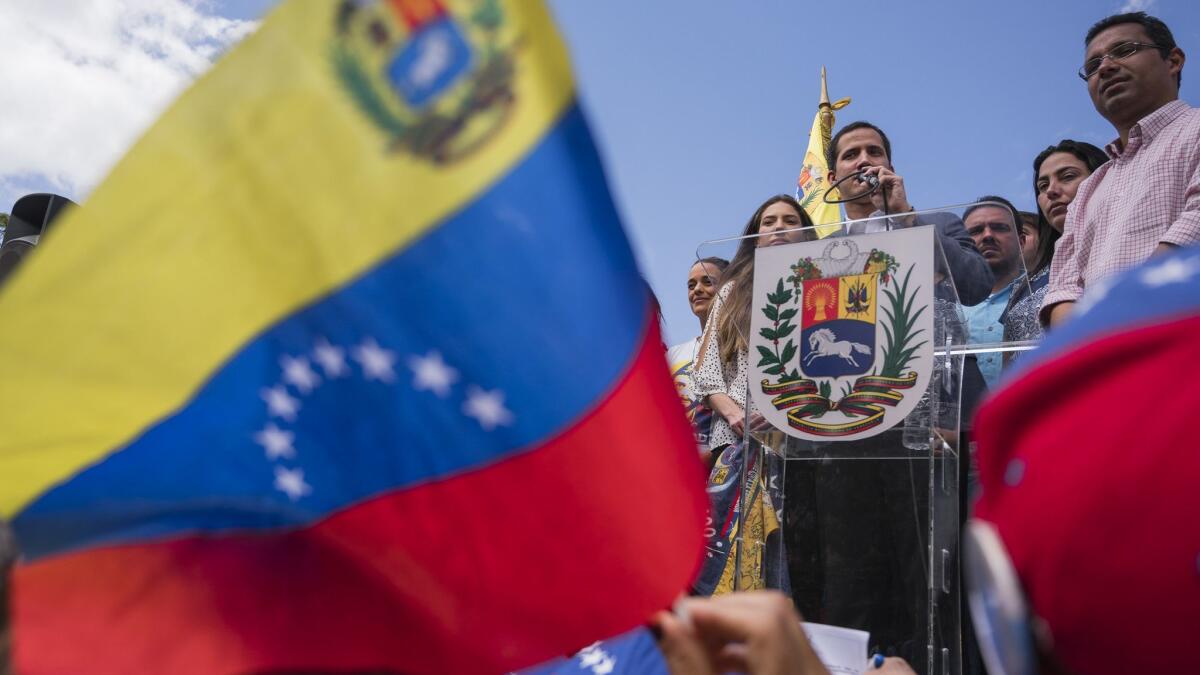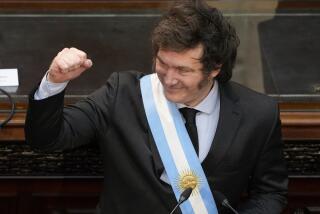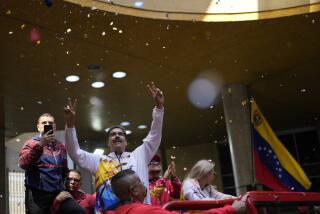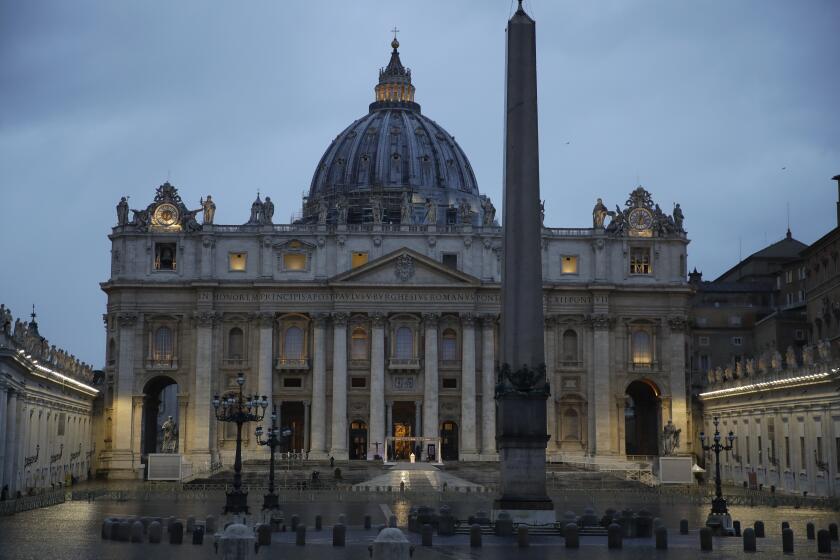Column: Trump pulls a surprise move in Venezuela

At first glance, President Trump’s decision to recognize an upstart opposition leader as president of Venezuela looks like an abrupt and risky break from diplomatic norms — vintage Trump, in other words.
But it may be the most traditional foreign policy move this president has ever made.
Not merely because Trump is seeking regime change in a Latin American country; the United States has done that for more than a century.
And not because the intervention was aimed at a leftist government allied with Cuba, long a target of hawkish Republicans.
The surprisingly normal thing was how downright multilateral the Trump administration was acting — as if the president hadn’t spent two years denouncing alliances as obstacles to his doctrine of America First.
Before the United States declared Venezuela’s President Nicolas Maduro “illegitimate,” State Department diplomats carefully marshaled support from other governments in Latin America and beyond.
They allowed the 14-nation Lima Group, which doesn’t include the United States, to take the lead in building the case against Maduro’s regime.
On Thursday, Secretary of State Michael R. Pompeo went to the Organization of American States, the Western Hemisphere’s hoary multilateral talk-shop, to ask for a resolution of support. He didn’t get a majority, but at least he tried.
Pompeo asked the United Nations Security Council for support, too. A White House official even praised the European Union for helping. That would be the same EU Trump has repeatedly denounced as a plot against the U.S. economy.
“This could actually be a case where the administration has gotten something right,” said John D. Feeley, a former U.S. ambassador to Panama who has been an acerbic critic of Trump’s diplomacy. “It hurts to say that, but it’s true.”
The main reason our instinctively unilateral president has suddenly resorted to traditional diplomacy is simple: Few other options are available.
From his first days in office, Trump and his aides identified Venezuela’s leftist regime as a threat to U.S. interests. Maduro is allied closely with Cuba, Russia and China. His government controls the world’s largest proven oil reserves, larger even than Saudi Arabia’s.
Yet economic mismanagement, corruption and skyrocketing crime under Maduro have brought the country to its knees. Millions of Venezuelans have fled to neighboring countries, creating a genuine refugee crisis.
When Trump got his first White House briefings on Venezuela, he asked whether U.S. military intervention would solve the problem. Worried aides told him an invasion would be disastrous.
“DOD [the Defense Department] said they were fighting enough wars already,” one told me.
U.S. officials then held a series of clandestine meetings with dissident Venezuelan military officers. But it wasn’t clear if they were capable of launching a coup d’etat — and, in any case, the officers were soon arrested.
That left diplomacy and economic pressure.
State Department officials encouraged the Lima Group to organize multilateral pressure against the Maduro regime. It was important that other countries took the lead to avoid making the effort look like U.S. imperialism.
“The Colombians and the Canadians were the ones who drove the process,” Feeley, who now works for Univision, the Spanish-language television network, told me.
A turning point came Jan. 4, when 13 of the 14 Lima Group countries jointly declared Maduro illegitimate. That opened the way for the head of Venezuela’s legislature, Juan Guaido, to declare himself “interim president.”
Now the U.S. Treasury Department is preparing an innovative new economic sanction: an effort to divert the cash Venezuela earns from oil exports away from Maduro to Guaido’s alternative government. The goal is to divide the regime, including its military, and bring about its collapse.
There’s no guarantee the plan will work. The oil revenue scheme could be blocked by lawsuits. Maduro’s forces could turn U.S. diplomats in Caracas into hostages. The regime could prove more resilient than expected.
But the nimble diplomacy of the United States and its allies has created a better chance of ousting Maduro without violence than before.
And it won the Trump administration praise from unexpected quarters; Sen. Richard J. Durbin (D-Ill.), the second-ranking Democrat in the Senate, and Rep. Adam B. Schiff (D-Burbank), chairman of the House Intelligence Committee, both endorsed the move.
It may even have a chance of teaching Trump a larger lesson: When the United States can’t get its way through unilateral action, old-fashioned alliances and multilateral organizations still come in handy.
That principle helped much of the world stay peaceful since the end of World War II. It should come in especially handy in an era when U.S. military and economic power is less dominant than before.
Or maybe not. On Thursday, Trump’s national security advisor, John R. Bolton, was asked by a reporter why the United States was intervening in Venezuela and not against other authoritarian regimes.
Bolton gave a brief nod to multilateralism, citing support for the U.S. position from Latin America and Europe. Then he offered another rationale —perhaps the oldest unilateralist principle in U.S. foreign policy, the Monroe Doctrine of 1823.
“The fact is Venezuela is in our hemisphere,” Bolton said. “I think we have a special responsibility here.”
More to Read
Get the L.A. Times Politics newsletter
Deeply reported insights into legislation, politics and policy from Sacramento, Washington and beyond. In your inbox three times per week.
You may occasionally receive promotional content from the Los Angeles Times.







